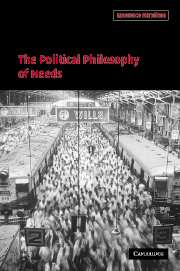Conclusion
Published online by Cambridge University Press: 22 September 2009
Summary
The goal of this political philosophy of needs was to develop and defend a theoretical conception that moves beyond the dominant rights-preferences couple and better articulates the material and ethical concerns of political theory and practice. Given the state of modern need theory and the impoverishment in political thought brought about by this couple, I focused most of my attention and energy on clarifying the nature and formation of needs and the actual and possible means of disclosing and evaluating needs.
There are five main conclusions to the political philosophy of needs developed in this book.
The Nature of Needs Felt needs are motivational forces that can take the form of drives or goals. Needs are distinguishable from wants and interests not because their lack of satisfaction creates lack or objective harm but because their satisfaction, lack of satisfaction, distortion or trajectory of development have direct, specifiable consequences on human functioning. Vital needs and agency needs together constitute the general necessary conditions for minimal human functioning and the individual and political agency that is characteristic of full human functioning. Social needs are particular manifestations of the general needs and of wants that have become legitimised as ineluctable.
- Type
- Chapter
- Information
- The Political Philosophy of Needs , pp. 171 - 184Publisher: Cambridge University PressPrint publication year: 2003



